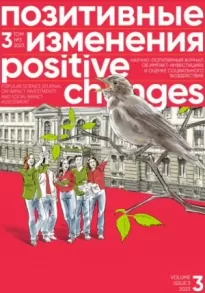Позитивные изменения. Том 3, № 3 (2023). Positive changes. Volume 3, Issue 3 (2023)

- Автор: Редакция журнала «Позитивные изменения»
- Жанр: Научная литература / Газеты и журналы
- Дата выхода: 2023
Читать книгу "Позитивные изменения. Том 3, № 3 (2023). Positive changes. Volume 3, Issue 3 (2023)"
KEY ELEMENTS FOR SUCCESS IN STRATEGY EXECUTION: FINDINGS FROM AN ORGANIZATIONAL IDENTITY STUDY
A pivotal driver in the university’s advancement and the realization of its strategic objectives, particularly within the realm of its third mission, is the reinforcement of organizational identity and the enhancement of its positioning in terms of communication. Specialized sociological investigations were conducted to probe into the university’s organizational culture and its image. The studies were carried out in March-April 2023 under the auspices of the Research Sociological Laboratory at Kursk State University, involving students and faculty. The researchers conducted surveys among 800 students and 132 members of the teaching staff, representing all faculties and institutes of the university.
Of paramount significance was the question about the university’s mission, as it serves to unveil the wide range of perceptions regarding the organization’s purpose and societal role. It is noteworthy that an overwhelming majority of the respondents perceive Kursk State University’s mission as centered on providing high-quality, accessible, and contemporary education. One in five students, and one in three faculty members, see this mission as the nurturing and harmonization of human potential, preparing individuals to meet the demands of the contemporary world. A smaller portion of students (3.2 %) and faculty members (3 %) view the mission through the lens of elevating the university’s prestige and bolstering its competitive edge (Table 1).
Table 1. Distribution of Answers to the Question About the Main Mission of Kursk State University (One Answer Option), %
As per the university’s student body, the mission finds its fullest realization through several key tasks,[127] namely:
• Training, retraining, and upskilling employees with higher education (50 %);
• Fulfilling individuals’ needs for intellectual, cultural, and moral development (38.3 %);
• Advancing sciences and arts through research and creative endeavors (32.5 %);
• Disseminating knowledge among the population and enhancing its educational and cultural prowess (30.5 %);
• Instilling students’ civic values, equipping students to navigate modern challenges (26.4 %);
• Safeguarding and enhancing the moral, cultural, and scientific values of the society (26.1 %).
It is evident that the resolution of these outlined tasks is directly intertwined with the accomplishment of all three of the university’s missions: education, research activities, and provision of services aimed at fostering public welfare. This encompasses the nurturing of human potential, fostering adherence to the cultural values, instilling patriotism and citizenship values, and cultivating an active life stance.
Organizational culture itself, as perceived by the majority of respondents (60.4 %), is seen as a framework composed of key elements: norms and behavioral guidelines, image and prestige, and the university’s values and traditions. Moreover, a majority of the students (67.1 %) share the belief that the university’s organizational culture is aligned with its primary objectives and overarching developmental pathways, meaning a strong connection between the organizational culture and the university’s strategic and tactical pursuits.
Table 2. Distribution of Answers to the Question About Kursk State University’s Ability to Respond to External Changes (One Answer Option), %
The essence of the university’s organizational culture is largely shaped by its capacity to adapt to external shifts and fluctuations. To gauge the extent to which this attribute resonates with Kursk State University, let’s turn to the insights presented in Table 2.
We can see that a significant portion of respondents perceive KSU as an institution that is open to change and quick to respond to it. Nearly one in four respondents highlights that KSU is in a constant state of refinement, learning from its own and others’ mistakes. One in five respondents describes the university as a rather conservative entity with certain traditions. A minuscule proportion of respondents (2.7 %) believe that KSU encounters difficulties when dealing with changes and innovations. Notably, there is a higher level of critical evaluation of the university’s adaptation to external changes among teachers compared to students.
Successful adaptation to innovations, an extensively developed organizational culture, and the university’s positioning on the regional, national, and global stages collectively contribute to the positive image of Kursk State University, as indicated by 90.3 % of respondents. According to students, factors influencing this image include the high level of teaching staff qualification (83 %), accomplishments of both students and faculty members across various domains on regional, national, and global platforms (67.1 %), successful job placements of university graduates (57.9 %), the reputation of the rector, vice-rectors, deans, and department heads (51.5 %), along with several others.
The survey has also unveiled a range of challenges in the development of the organizational culture of university students and the manifestation of their organizational socialization.[128] These challenges primarily stem from the volitional and activity-related traits of the students themselves, including insufficient initiative and activity among certain student groups, occasional lack of cohesion within the student body, and an inability to effectively plan and allocate their own time. Nonetheless, the findings affirm that the university has cultivated a fairly advanced organizational culture within both the teaching and student communities. This culture enables the institution to enhance its image as a leading higher education establishment in the Kursk region, effectively realizing all three of the university’s missions.





